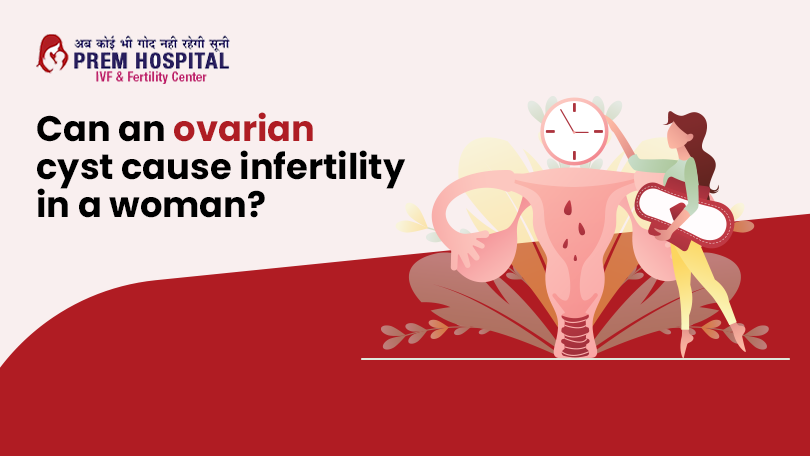Ovarian cysts develop within your ovaries. They are typically fluid-filled sacs that are not malignant in origin. Ovarian cysts can be identified using ultrasound or other imaging procedures that will assist your doctor in determining their size. While nearly all ovarian cysts do not cause symptoms, you may experience pain and discomfort as they get worse. It is also crucial to fertility treatment for women.
Ovarian cysts can sometimes be a sign of more serious underlying medical conditions, such as endometriosis or polycystic ovarian syndrome (PCOS). The majority of ovarian cysts are benign and go away on their own in a few months. Still, occasionally, they might hurt or be uncomfortable, or they can get big and perhaps turn cancerous. During female infertility treatment, ovarian cysts will be identified using ultrasound by an OB/GYN, who may then suggest additional tests or treatment if necessary.
What are the most prominent symptoms of an ovarian cyst?
Sometimes, smaller cysts go unnoticed during a physical examination. You might not even be aware of the cyst in these situations. Larger cysts can lead to:
- Backache
- Discomfort in the pelvis.
- Lower abdominal bloating or sense of fullness that may be more noticeable on one side of your body.
- Dyspareunia, or pain during sexual activity.
- Painful period.
If these symptoms persist, you might want to get checked for a disease known as polycystic ovarian syndrome (PCOS). PCOS is a disorder that leads to irregular menstrual cycles and other hormone-related issues, such as obesity and infertility. Hirsutism (increased body hair development) and trouble reducing weight are other signs of polycystic ovarian syndrome during female infertility treatment.
Different people have different ovarian cyst experiences. You could feel:
- Absolutely no pain.
- A little discomfort or a sensation of being full
- An aching that might be described as dull or intense.
- Erratic or intermittent discomfort or pain
However, you must seek professional help if you sense any of the symptoms, no matter how mild they are.
How are ovarian cysts diagnosed?
Prior to treating you or before starting female infertility treatment, your doctor will rule out pregnancy as the source of your symptoms. After that, they could conduct the following tests to find an ovarian cyst:
- Pelvic Examination: During a pelvic exam, your doctor will feel your pelvis for any lumps or modifications.
- Ultrasound: This imaging technique employs sound waves to produce pictures of the inside organs of your body. It can locate and determine the predominant fluid or solid nature of cysts on your ovaries.
- Laparoscopy: This is a surgical technique that is done there. Your healthcare professional inserts a camera through a cut or incision in your abdomen so they can see your pelvic cavity and reproductive organs. At this point, if your doctor identifies a cyst, it can be removed.
Ovarian cysts: a factor in infertility?
In most cases, cysts do not make it more difficult to get pregnant. Resolving this issue is a major part of female infertility treatment options. However, if an underlying illness like endometriosis is the origin of the cysts, you may experience fertility issues.
More than one in ten women of reproductive age in the world have endometriosis, a common illness. Endometriosis is a disorder where tissues that resemble the uterine lining implant or grow on the body’s external uterine structures, such as the ovaries or fallopian tubes.
Although endometriosis does affect fertility, it is still possible to get pregnant. With endometriosis, 30–40% of women may experience infertility issues. Consult your fertility specialist to learn more about endometriosis treatment choices that can help you achieve your unique fertility objectives.
The following might cause ovarian cysts:
Endometriosis
Endometriosis is the root cause of these ovarian cysts. It is a disorder when the endometrium, the tissue that normally lines the uterus, begins to grow outside of it. It is thought that endometriomas cause infertility.
PCOS-related (polycystic ovary syndrome) ovarian cysts
Small cysts are growing in your ovaries as a result of PCOS, a disorder. Your menstrual cycles become erratic as a result. A few reproductive hormones are elevated as a result of the illness. Additionally, PCOS results in an abnormal ovulation cycle, which is regarded as the root of female infertility.
The following ovarian cysts do not interfere with fertility.
The ovaries are where these cysts most frequently develop. Follicular cysts and corpus luteum cysts are examples of functioning cysts. The development of functional cysts often occurs during a typical menstrual cycle. It is determined that they do not contribute to or cause infertility problems. Functional cysts, on the other hand, show that the processes required to promote or increase fertility are in motion.
Cystadenomas
On the surface of the ovary, these growths appear. There is little evidence to state that cystadenomas induce infertility despite the fact that their development necessitates treatment.
Dermoid Cyst
Dermoid cysts are entirely related to epidermal tissues, including skin, hair, teeth, and so forth. There is no fluid inside the cysts. Dermoid cysts have not yet been connected to infertility.
Contact an expert OB/GYN at a reputable center such as Prem Hospital Meerut as soon as possible if you have been told you have ovarian cysts and want to start trying to conceive so they can provide possible treatment options to improve your chances of becoming pregnant.

